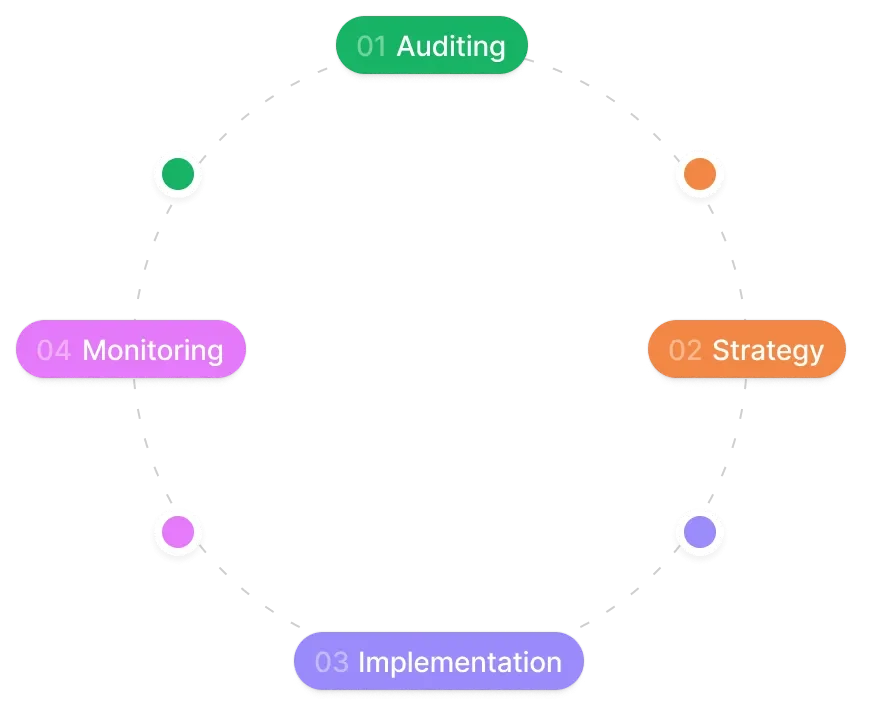Welcome to Getting Mentioned by AI

Journey
to be
Mentioned

by
AI

Cracking the code of AI visibility together.

The Journey
Our Mission
Think about it: by 2028, traditional search as we know it will be history. People won’t “Google” their questions anymore. They’ll just ask AI. ChatGPT, Gemini, Claude, Perplexity… these tools will be the ones deciding which sources get mentioned, which ones get trusted, and which ones get shared.
We’re Mike and Ed. We’ve been Digital Footprint Specialists for nearly two decades, and honestly? We’ve seen a lot. Algorithm updates that kept us up at night. Platform shifts that changed everything overnight. But this? This feels different. This is massive.
Our mission? Simple: figure out how to get mentioned by AI. We’re not sitting around waiting for the future to happen. We’re jumping in headfirst, testing things out, making mistakes, learning as we go; and sharing everything we discover along the way.
Here’s our promise: No hype. No BS. No wild guesses. Just real experiments, honest insights, and an inside look at what’s actually working (and what’s not).
Our latest discoveries
THE NEW ERA OF SEARCH
The New Frontier
Look, we get it. This AI stuff can feel overwhelming. So we’re breaking it all down into bite-sized pieces that actually make sense. No jargon overload. No black-box mystery. Just clear steps you can follow, understand, and actually use. You’ll know exactly what we’re doing, why we’re doing it, and how it’s working (or not). This is your journey as much as it is ours.


Frequently asked questions
What is LLM SEO and how does it differ from traditional SEO?
LLM SEO (Large Language Model SEO) focuses on optimizing content to appear in AI-generated responses from chatbots like ChatGPT, Claude, and Gemini, rather than just ranking on traditional search engine results pages. While traditional SEO targets Google’s algorithm and aims for high rankings in blue links, LLM SEO ensures your content is selected, cited, and recommended by AI assistants that synthesize information from multiple sources.
Why is LLM SEO becoming important now?
The way people search for information is rapidly evolving. Millions of users now turn to AI chatbots for answers instead of traditional search engines. Studies show that AI-powered search tools like ChatGPT and Perplexity are capturing significant search volume, especially among younger demographics. If your content isn’t optimized for LLMs, you’re missing out on an increasingly important channel for visibility and traffic.
Will traditional SEO become obsolete?
No, traditional SEO isn’t obsolete—it’s evolving. Think of LLM SEO as an extension of your existing strategy rather than a replacement. Traditional search engines still drive enormous traffic, but the search landscape is diversifying. Smart businesses are optimizing for both traditional search engines and AI assistants to maximize their overall visibility across all platforms where their audience seeks information.
How do LLMs choose which content to cite or recommend?
LLMs prioritize content that is authoritative, well-structured, factually accurate, and clearly written. They favor sources with strong credibility indicators, comprehensive information, proper citations, and content that directly answers questions. Unlike traditional SEO where backlinks are crucial, LLM SEO emphasizes content quality, accuracy, expertise, and how well your information aligns with what the AI model has been trained to recognize as trustworthy.
What are the key ranking factors for LLM SEO?
Key factors include content authority and expertise, clear and structured information architecture, factual accuracy and up-to-date information, direct and concise answers to common questions, proper use of headers and semantic HTML, inclusion of data and statistics, citation-worthy original research or insights, and brand recognition. Domain authority still matters, but content quality and structure matter even more in LLM contexts.
How should I restructure my content for LLM optimization?
Start by organizing content with clear hierarchies using descriptive headers. Create FAQ sections that directly answer common questions. Include concise summaries at the beginning of long articles. Break complex topics into digestible sections. Use structured data markup. Add context and definitions for technical terms. Ensure your content can stand alone—LLMs often extract snippets, so each section should be self-contained and comprehensible without requiring the full article context.
Do backlinks still matter in an LLM-dominated world?
Backlinks remain important but their role is shifting. In traditional SEO, backlinks directly influence rankings. For LLM SEO, backlinks contribute to your overall domain authority and credibility, which influences whether LLMs perceive your content as trustworthy. However, the direct answer quality and content structure matter more for LLM citation. Focus on earning backlinks from authoritative sources as a credibility signal rather than purely as a ranking mechanism.
How can I measure success in LLM SEO?
Measuring LLM SEO is still evolving, but you can track brand mentions in AI responses by regularly querying LLMs about topics in your niche, monitor referral traffic from AI platforms, track branded search volume increases, survey customers about how they discovered you, and watch for increases in direct traffic that may indicate AI-driven awareness. Some emerging tools are beginning to offer “AI visibility” metrics that track how often your brand appears in LLM responses.
What types of businesses benefit most from LLM SEO?
Businesses that provide informational content, professional services, B2B companies, educational platforms, healthcare and wellness providers, financial services, and software/tech companies benefit significantly. Any business where customers research before purchasing should invest in LLM SEO. If your audience asks questions that AI assistants can answer, you need to ensure your content is part of those answers.
What's the biggest mistake companies make when approaching LLM SEO?
The biggest mistake is simply repurposing traditional SEO content without adapting it for how LLMs consume and present information. LLMs don’t just rank pages—they synthesize information from multiple sources. Your content needs to be citation-worthy: clear, authoritative, accurate, and valuable enough that an AI would choose to reference it over competitors. Another common mistake is neglecting to establish topical authority across related subjects rather than just targeting isolated keywords.



